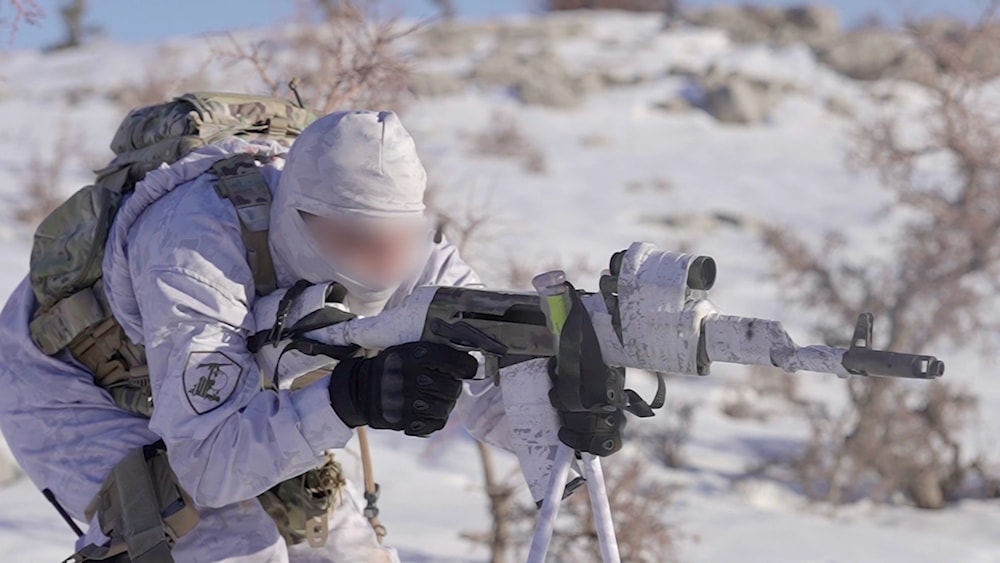Israeli analyst says war with Lebanon costly in winter: Israeli media
Israeli analysts underline that if the war with Lebanon protracts, the Israeli occupation's losses would only mount, particularly in winter.
-

A Hezbollah fighter during military drills in the snow, which was released on February 15, 2022 (Islamic Resistance Military Media)
Military affairs analyst Yoav Limor, a columnist for Israel Hayom, highlighted the urgent need for a ceasefire on the northern front with Lebanon, warning against "sinking into the Lebanese quagmire."
Limor noted that "continued fighting through the Lebanese winter could exact a heavy price on Israel," suggesting that stabilizing the northern front would allow the Israeli occupation forces to refocus on Gaza and address the issue of captives.
He emphasized that ongoing war would bring substantial costs, including increased casualties as winter sets in, warning of further erosion of the occupation's international legitimacy, significant economic impacts, increased strain on military reserves, and delays in the return of northern settlers.
Moreover, he estimated that the Israeli occupation forces could wrap up ongoing operations in southern Lebanon within two weeks, a period that could also be used to "inflict more damage on Hezbollah's strategic infrastructure."
The Israeli journalist suggested that halting the northern front would bring the occupation back to its initial focus: Gaza. Limor remarked that, regardless of the upcoming administration in Washington, the Israeli occupation would soon need to address Gaza's future, particularly the hostage situation.
Amid Israeli circles, questions continue to arise about the viability and endgame of the war with Hezbollah in Lebanon.
Unrelenting pressure
Israeli forces have been caught off guard by Hezbollah's resilience, as the Resistance movement continues to launch rockets and drones, engaging Israeli forces at the border and inflicting notable losses. Calls to halt northern hostilities and negotiate an agreement have grown louder within the Israeli occupation.
In line with this sentiment, the Israeli Maariv newspaper acknowledged Hezbollah's capacity to sustain long-term pressure on the occupation through continued artillery and rocket fire. The newspaper confirmed that Hezbollah has retained its missile capabilities and has been intensifying attacks on Israeli cities such as Safad and Haifa.
Former Gaza Division commander, Maj. Gen. (Res.) Gadi Shamni also criticized Prime Minister Benjamin Netanyahu, describing him as "detached from his people and soldiers" and blaming him for what he called the government's "complete failure." Shamni argued that the Israeli occupation urgently needed to end the war and secure the release of captives.
Meanwhile, Hezbollah reiterated its readiness for prolonged confrontation and stated it would not accept a ceasefire on Israeli terms, asserting that it "negotiates from a position of strength," with the battlefield ultimately determining the outcome.
On his part, former commander of the Israeli Northern Corps, Noam Tibon, highlighted that more than 800 Israeli soldiers have been killed and around 12,000 injured, with thousands suffering from post-traumatic stress disorder (PTSD) since the war began a year ago.
"We have lost the manpower of a whole division, and we need three additional divisions; otherwise, we will find it difficult to defend Israel," Tibon underscored.
'Israel' has long way to go to 'defeat Hezbollah': Jerusalem Post
On Monday, Israeli media reported that the number of Israeli soldiers killed in southern Lebanon is increasing daily rather than decreasing over time.
An analysis by Seth Frantzman published in the Israeli newspaper The Jerusalem Post pointed out that, after a month into war with Lebanon, the Israeli operation has begun to "take toll".
The strikes "Israel" conducted to supposedly weaken Hezbollah’s command and control have failed to meet their objectives, as the Lebanese group's leadership remains intact and capable of continuing its deadly operations, Frantzman indicated.
Despite that the assassination of Hezbollah commanders and Secretary-General Sayyed Hassan Nasrallah "should have weakened the group’s command and control," the Gaza war has revealed that such movements "are capable of replacing commanders even as they suffer blows," according to Frantzman.

 4 Min Read
4 Min Read









